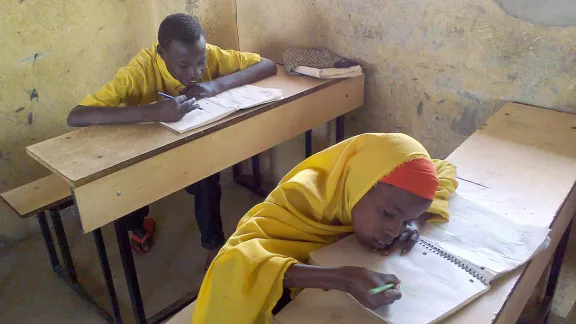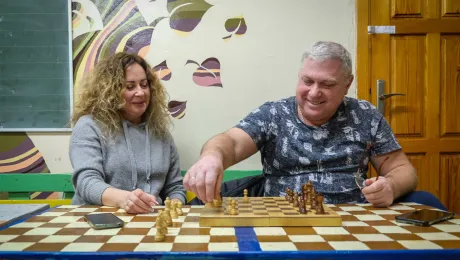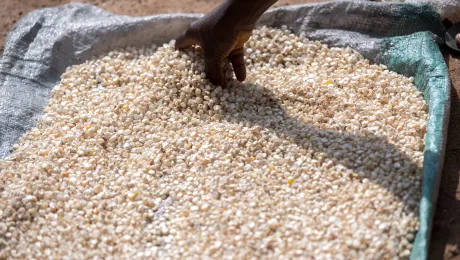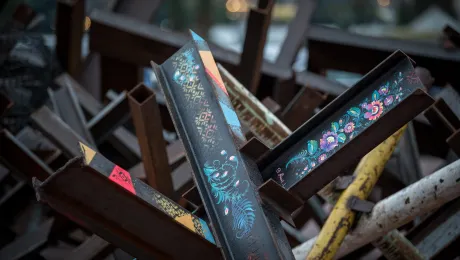
Hussein (left) and his sister Nadhifo, the two siblings of the Ali family in class at Hagadera refugee camp, Dadaab Kenya. Photo: LWF Kenya â Dadaab
By Lawi Malenje
Ali Hassan Matan and his wife Adey Wiro Arore and their family have encountered various forms of hardships but never given up on life.
They were among the first refugees to arrive in Dadaab, Kenya more than 22 years ago as they fled the war that has torn Somalia apart. At Dadaab’s Hagadera refugee camp, the couple was keen to start a new life, in a foreign country as refugees.
They now have eight children, four girls and four boys—one of the happiest parts of their life as a family.
However, five of their children have disabilities.
“I realized that my children had delayed milestones in sitting, crawling and talking,” explains Arore. Her sick and bedridden 50-year-old husband adds that it is not easy raising five children with disabilities.
Stigmatized
“My family felt stigmatized and discriminated. Nobody wanted to interact with my children because they appeared different from other children,” Matan recalls.
He says the children could not control the flow of saliva, had incoherent slurred speech and uncoordinated use of their limbs. Enrolling them in school was out of question because the parents thought they would not be able to learn anything.
With a large family to fend for, and with no one to attend to their children, Matan and his wife decided to lock them up. This, in their view, was the only way the children could be prevented from wandering too far and getting lost in the sprawling camp.
It also allowed the parents, especially Arore, opportunity to perform other household chores and attend to the other children.
Skeptical at First
The Lutheran World Federation (LWF) learned about the family in 2011 when a Special Needs Education (SNE) incentive teacher from Upendo Primary School visited the family. During the visit the teacher noted the children’s troubles and informed the parents that LWF had employed trained SNE teachers, specializing in different types of disabilities.
The teacher explained that children with disabilities could go to school and learn, play and interact socially like any other child. Matan was initially skeptical but decided to visit the school. The couple agreed to enroll two of their children, Hussein and Nadhifo in school.
Surprised
After two months of exposure in an environment encouraging learning and playing, the parents were pleasantly surprised to see that Hussein and Nadhifo were showing positive changes in their physical movement and speech.
“The children were finally able to utter some intelligible words and could find their way home without guidance,” Matan says joyfully.
He says he is proud of his children because “they have improved greatly, going to school has improved their recognition skills, they can differentiate items, can identify what is used for what. Now we can send them to the shop and they come back with what we wanted.”
Their mother reveals that the children can now look after their own toileting, bathing, and general grooming.
Teacher Mwalimu Meja agrees that there has been tremendous progress in the lives of Hussein and Nadhifo. Meja and his team also assessed Roble, another one of the children and the parents agreed that he should also attend the school.
Sheltered Facility
“We shall concentrate more on training him on social skills and walking upright,” adds Meja.
Meja’s desire is to have a sheltered pre-vocational facility established in the camp so that children with disabilities can acquire skills such as weaving, bead making and other vocational skills that could give them financial independence.
The DWS Kenya/Djibouti program has 52,859 learners in schools in Dadaab, from early childhood to secondary. The camps in Dadaab are currently home to nearly 340,000 Somali refugees.
Lawi Malenje is a braille transcriber for the LWF/DWS Dadaab sub-program


